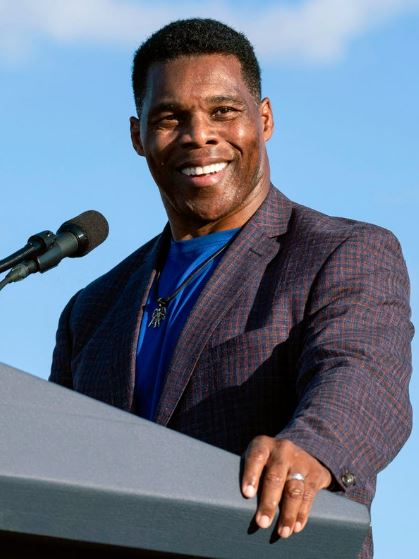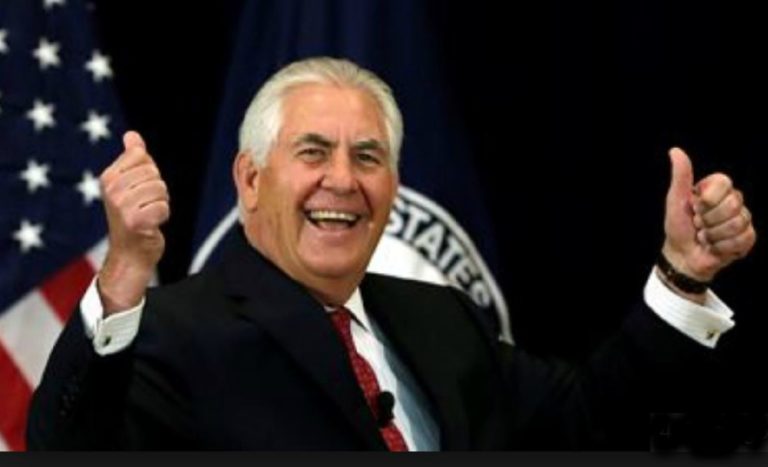H.R. 2003: “Inhofed,” But Alive and Well!
Will the Real James Inhofe, Please Stand Up!?
Al. Mariam (11 August 2008)– Oyez! Oyez! Oyez! Republican Oklahoma Senator James Inhofe, defender and self-described “brother” and “friend” of dictator Zenawi and arch nemesis of H.R. 2003 in the U.S. Senate, is a champion of human rights! Don’t laugh. It is true. I think. Oyez! Oyez! Oyez! Republican Oklahoma Senator James Inhofe is a coddler of thugs, criminals, human rights violators and war criminals! Is he? I am pretty sure of it. Then again, may be not. Will the real James Inhofe, please stand up!?
In June, 2008, Inhofe co-sponsored Senate Resolution 611 (so-called “sense of the Senate” resolution) in “support of the people of Zimbabwe,” and “in condemnation of the Mugabe regime for its manipulation of the country’s electoral process”. In April, 2008, Inhofe co-signed a letter hammering Chinese President Hu Jintao for “not respecting the basic rights of the people of Tibet” and clamping down on the press. In October, 2007, Inhofe furiously condemned and vowed to oppose H.R. 2003 (“Ethiopia Democracy and Accountability Act of 2007”) as a piece of legislation that “enflames tensions already present in the Horn of Africa, threatening regional stability and long term U.S. national security.”
Zimbabwe, China and Ethiopia: Two Dictatorships and One Democracy?
On June 26, 2008, Sen. Inhofe made the following pontificating speech in the U.S. Senate:
I rise today to call to attention to a place that has been lost in the sea of many other conflicts and crises plaguing our world. Zimbabwe… has faced and continues to face difficult challenges and untold sufferings, caused primarily by an authoritarian and corrupt leader, Robert Mugabe… In the 1990s, the country continued to weaken under the self-centered leadership of Mugabe. As the book of Proverbs tells us, “Where there is no vision, the people perish…” (Proverbs 29:18) Robert Mugabe failed to provide a vision for his country, focusing solely upon himself and his ability to remain in power…. Foreign Policy magazine ranks Zimbabwe 4th on the scale of failed states… Throughout almost 30 years of Mugabe’s rule, he has worked to tighten his reign over the nation by intimidation, violence, and oppression… On March 29, 2008, Zimbabwe held presidential elections… [which] was tainted by intimidation of voters and violence against the opposition party and supporters of the opposition; political rallies were banned; the opposition party’s secretary general was jailed, denied bail, tried with treason, and may face the death penalty. There are also reports that the regime is restricting access to food in opposition areas, threatening already hungry people to either vote for Mugabe or starve.
Inhofe concluded:
While Mugabe leads Zimbabwe away from reaching its full potential, there are other leaders on the continent that have chosen a vision of democracy, freedom and progress for their countries. While not perfect, each of them is making improvements and taking strides to improve democratic practices and exercise free political will. It is time for Mugabe to allow his people to decide the next phase and direction of their country. I call on African leaders, many of whom are my friends and brothers, and leaders all over the world to do what they can to help the people of Zimbabwe. (Italics added.)
On April 2, 2008, Inhofe co-signed a letter with other senators calling on Chinese President Hu Jintao to end the crisis in Tibet. The letter stated:
We write today to respectfully urge you, in the strongest possible terms, to take all necessary steps to bring about a peaceful resolution to the current crisis in Tibet and to respect the human rights of the Tibetan people.
First and foremost, we ask that the Chinese government remove its restrictions on the media and communications, and allow independent monitors and the foreign press unfettered access to the region. We also ask that the government release those detained for peaceful protest and demonstrate respect for the internationally-recognized right to peaceful assembly and expression of political opinion.
The protests seem to reflect long-simmering Tibetan resentment toward Chinese policies and laws that have failed to respect the basic rights of the people of Tibet. In any such dialogue, it is vitally important that the Chinese set forth a timeline and framework for evaluation of substantive progress. (Italics added.)
On October 17, 2007, Inhofe slammed “The Ethiopia Democracy and Accountability Act of 2007” (H.R. 2003) after it passed in the U.S. House of Representatives. He condemned the legislation for its focus on “shortcomings while blatantly ignoring the unprecedented progress the country has made.” Inhofe expounded:
The language contained in H.R. 2003 enflames tensions already present in the Horn of Africa, threatening regional stability and long term U.S. national security. The growing instability in Somalia and the Ogaden region, combined with the unresolved border dispute between Ethiopia and Eritrea in the north, has created major challenges for Ethiopia. While I agree that the violence and intimidation that took place in the country after the 2005 election was an unnecessary use of excessive force, the Government of Ethiopia has taken significant steps to regain a democratic process that is fair and respectful of human rights. During my recent trip to Africa in April, I witnessed first-hand Ethiopia’s democratic progress and commitment in fighting terrorism.
Although I appreciate the increased attention being given to Africa and particularly Ethiopia, I believe the bill takes the wrong approach by placing demands on a friend and ally that has made obvious advancements in democracy and human rights. (Italics added.)
On Planet Inhofe
Inhofe lives on a loony planet that he shares only with his “brothers” and “friends”. As the ranking member of the Senate Committee on Environment and Public Works, he has described global warming as “the second greatest hoax ever perpetrated on the American people after the separation of church and state.” He has proposed that the “global warming hoax” might be perpetrated by the Weather Channel: “We all know the Weather Channel would like to have people afraid all the time.” He has compared environmentalists to Nazis (“they remind me of the Third Reich”) and described the U.S. Environmental Protection Agency as “a Gestapo bureaucracy”. During a Senate Armed Services Committee hearing on the mistreatment of detainees at Abu Ghraib prison in Iraq, Inhofe justified the use of torture by reminding his fellow senators that the detainee suspects are actually bad hombres: “You know, they’re not there for traffic violations…. [The detainees] are murderers, they’re terrorists, they’re insurgents.” In light of Inhofe’s numerous goofy and preposterous statements, Professor Bruce Jackson, Distinguished Professor and Samuel P. Capen Professor of American Culture at the State University of New York, Bufffalo, has described him as “may be the dumbest U.S. Senator of them all.”
Of course, none of us should be surprised by Inhofe’s dogmatic opposition to H.R. 2003, and his blind support for Zenawi. On Planet Inhofe, wrong is right if it is politically expedient. Right is wrong if the objective facts offend Inhofe’s sensibilities. Personal friendships trump everything, including principles, morality, ethics, and especially the cold, hard facts. Planet Inhofe is ultimately a fanciful Manichaean world of good and evil. Mugabe is evil, Zenawi is good. Mugabe is “self-centered”, has “no vision”, and “solely” concerned about “his ability to remain in power”. But Zenawi is a man of vision so unconcerned with remaining in power that he has banned all opposition parties, jailed their leaders, decimated the free press and rules solely by intimidation and violence. Mugabe is single handedly responsible for making Zimbabwe a “failed state” (no. 3 on the Failed State Index, 2008), but Zenawi is an illustrious leader for doing the same thing to Ethiopia (no. 16 on the Index). Mugabe is a “corrupt dictator” for putting Zimbawe at the rank of 150 out of 179 countries on the Corruption Index (2007), but Zenawi is a conscientious and respectable leader for putting Ethiopia at the rank of 138th out of 179 countries on the same Index.
On Planet Inhofe, Mugabe is an “authoritarian” leader by conducting elections that are “tainted by intimidation of voters and violence against the opposition party and their supporters”, but Zenawi is a benevolent leader who has “taken significant steps to regain a democratic process that is fair and respectful of human rights” by jailing opposition leaders, human rights advocates and journalists, and thousands of ordinary citizens suspected of disloyalty to his regime. Mugabe is a heartless and ruthless despot for “threatening already hungry people to either vote for Mugabe or starve”, but Zenawi is an enlightened leader for weaponizing famine against civilians, creating the second largest refugee population (after Darfur) in Africa, and condemning 13 million Ethiopians to avoidable famine. “It is time for Mugabe to allow his people to decide the next phase and direction of their country,” but it is NOT time for Zenawi to do the same in Ethiopia.
Similarly, Hu Jintao is a villainous oppressor for not “respecting the human rights of the Tibetan people”, and for refusing to “remove restrictions on the media and communications”, but Zenawi is a “great African leader” for trampling on the human rights of Ethiopians and making Ethiopia in 2007 the country “where press freedom has deteriorated the most over the past five years” (Committee to Protect Journalists). It is necessary to “release peaceful protesters” in Tibet, but it is perfectly acceptable to warehouse hundreds of thousands of Ethiopians in Oromiya region. It is vitally important” for Jintao “to set a timeline for substantive progress in Tibet,” but it is not time for Zenawi to do the same in Ethiopia.
The bottom line is that Inhofe is a man completely lost on a desolate planet of ethical and political relativism and moral nihilism. For Inhofe, there is really no right and wrong. It is all about political expediency and opportunism. If a guy is a maniacal human rights violator and certified war criminal but is useful in fighting terrorism, then the guy’s egregious crimes can be overlooked, excused and justified. In fact, the criminal is to be lionized as a “Hero of the War on Terrorism”. For Inhofe, all crimes, immorality and wickedness are justifiable. Such is life on the wacky planet of James Inhofe!
H.R. 2003: “Inhofed” and Tag-teamed, But Very Much Alive!
Inhofe is the quarterback on Team D.L.A. Piper lined up against H.R. 2003 in the Senate. He “calls the plays in the (Senate) huddle.” Inhofe’s strategy is to use Senate procedures to delay and/or prevent action on the bill in committee; and to keep it away from the floor by making a veiled threat of a filibuster. This partly explains the apparent lack of visible legislative activity on H.R. 2003 in the Senate, which has led some people to believe the bill is “dead”. Zenawi certainly hopes that we could be duped into believing that, but lamentations for H.R. 2003 may be somewhat premature, and its demise greatly exaggerated. To understand the current status of H.R. 2003 in the Senate, one must appreciate the peculiarities of that institution, which regrettably can not be fully explained in this piece. Suffice it to say that many bills, far more “important” bills than our H.R. 2003, have been stymied, but certainly not dead, in the Senate over the past year, including measures seeking immigration and health care financing reform, consumer protection, energy policy and regulation of green house emissions.
Readers unfamiliar with the Senate legislative process may find it useful to know that the process that resulted in passage of H.R. 2003 in the House is very different from the one in the Senate. With only 100 members (compared to 435 members in the House), the Senate has its own unique institutional and interactive dynamics. There are two distinctive aspects of the Senate process which Inhofe could exploit to undermine H.R. 2003: 1) the relative informality of the Senate legislative process, and 2) the unlimited opportunities for each Senator to be heard and offer as many amendments, relevant or otherwise, to any legislation under consideration.
Senate rules and practices promote full deliberation on issues presented to the body. But in the deliberative process, greater emphasis is placed on the rights of individual Senators, often at the expense of the interests of the majority. Much of the Senate’s business is conducted by way of “unanimous consent”, a process by which agreements between individual Senators are brokered and worked out in advance of floor consideration. But a single Senator can block a unanimous consent request on an issue of special interest to him/her. Often by objecting to a unanimous consent request to take up a measure, the individual Senator is implicitly threatening to filibuster (or unlimited debate), which could effectively tie up Senate business for a significant period of time.
The purpose of a filibuster is to delay progress on a piece of legislation or prevent a final Senate floor vote on it. A filibuster allows an individual Senator to speak against a bill (or talk about anything else s/he wishes) at indefinite length (the Civil Rights Act of 1964 was filibustered by teams of Senators for 57 days and nights), or delay action on a measure by offering numerous (relevant and irrelevant) amendments and motions. A filibuster could be ended by 1) changing the bill as desired by the filibustering Senator, 2) withdrawing it from consideration, or 3) “cloture” (closure) which requires a petition signed by 16 Senators and a vote of 60 Senators to end debate, and vote on the measure. With the U.S. Senate evenly divided across party lines (presently there are 49 democrats and 49 republicans in the Senate, with two “independents”), it would not be easy to end a filibuster by cloture, which means a filibustered bill will likely be withdrawn from consideration and no floor vote taken. Moreover, an individual Senator can also place a “hold” (requests by Senators to be consulted personally before a matter is brought up for consideration) on a bill. Usually, the majority leader (leader of the party controlling the Senate) will not even consider bringing a measure to the floor and request unanimous consent to consider it if there is an outstanding hold placed by a Senator.
In short, Inhofe and Team D.L.A. Piper have potent weapons in Senate procedures and practices to keep H.R. 2003 from coming to the floor for consideration. He can put a “hold” on the bill, decline to give unanimous consent and refuse to waive the rules, or filibuster it if it should somehow get to the floor. But that does not mean H.R. 2003 is “dead”. Not by a long shot. For now, let’s just say that as “there are more ways than one to skin a cat,” so there are more ways than one to get H.R. 2003 as part of American law and foreign policy. Of course, Zenawi would like to have us believe that the bill is “dead” and all our efforts have been in vain. Our psychological defeat and collective demoralization means more to him and gives him infinitely greater satisfaction than passage of the bill itself. But we should always remember that if H.R. 2003 is defeated on the Senate floor today, we can have it reintroduced next year or the year after that and try to get it passed again. But if we allow Zenawi or anyone else to use the fact of delayed action or lack of Senate floor consideration of H.R. 2003 the first time around to break our fighting spirit and shatter our collective resolve to promote and defend human rights in Ethiopia, then we would have delivered to him his greatest victory; and if we should let this happen, we are not worthy of being called defenders of human rights and liberty!
Let us draw inspiration from Winston Churchill, who under the mighty Nazi war machine felt “many countries had closed the account” on his homeland: “Never give in, never give in, never, never, never, never– in nothing, great or small, large or petty — never give in except to convictions of honour and good sense. Never yield to force; never yield to the apparently overwhelming might of the enemy.” NEVER!
Never Give In, But Always Have Faith
Never give in, but ALWAYS have FAITH that the forces of GOOD will win over the forces of EVIL. Have FAITH that the bells of liberty will ring from Badme in the north to Moyale in the south, and from Malwal to the west to Domo on the east because God is on our side; and as William Cowper set to verse:
“God moves in a mysterious way his wonders to perform
He plants his footsteps in the sea
and rides upon the storm. …
You fearful saints, fresh courage take;
the clouds you so much dread
Are big with mercy and shall break
in blessings on your head…”
Lying Tongue, and Hands…
Senator Inhofe cited Proverbs 29:18 to teach Mugabe that “Where there is no vision, the people perish…” We wonder if Mr. Inhofe has learned anything from Proverbs 6:17 about the things that are an abomination to the Lord: “A proud look, a lying tongue, and hands that shed innocent blood.”





